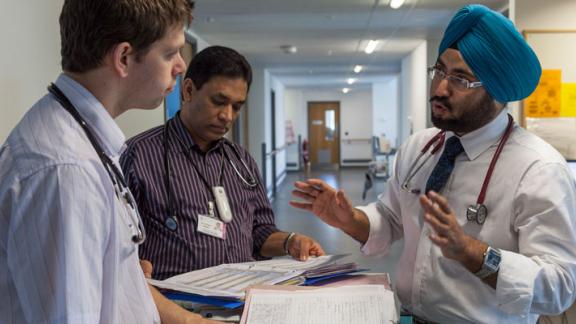Recruiting specialist grade doctors

Overview
QEHKL used the introduction of the 2021 specialist doctor grade as an opportunity to review its medical workforce and look at ways to promote doctors and offer them a national contract.
Key benefits and outcomes
- Promotion of specialist doctors.
- Retained highly-experienced doctors.
- An increase in staff satisfaction.
What the organisation faced
QEHKL has a SAS workforce of over 80 and understands and values the hard work that their SAS doctors contribute to the service. A review of the medical workforce saw there was scope to invite doctors to apply for the new specialist doctor grade which saw the promotion of specialty doctors and retention of experienced staff.
What the organisation did
Workforce assessment panels were organised for each department, chaired by the medical director, with multi-disciplinary attendance from the medical workforce, such as finance, the local negotiating committee (LNC), departmental managers and a clinical director from a non-conflicting specialty.
The panels came together to discuss their department and identified individuals who met the specialist grade generic capabilities framework. Those identified included experienced specialty doctors and locum consultants on fixed-term contracts.
The assessment panels worked well because when doctors that met the criteria were identified, they could also discuss departmental budgets with finance colleagues, to make sure suitable offers could be made to individuals.
Once the assessment panels were completed, the medical staffing team contacted doctors to provide specialist grade information packs and answer any queries. Those eligible were invited to apply for a specialist grade post via competitive entry.
Results and benefits
The specialist grade role is a natural career progression for specialty doctors and 50 per cent of specialty doctors who expressed an interest in the new contract, applied for a specialist grade role.
The trust has retained highly-experienced doctors who can work autonomously and provide a high-level of patient care.
The assessment panels saved time overall by key stakeholders meeting together to agree on outcomes that avoided potential delays in decision making. Holding individual conversations helped understand and address any concerns. The information packs and materials, provided by NHS Employers and the British Medical Association (BMA), gave doctors the information they needed to make an informed decision.
The trust's review of its existing establishments meant that new candidates were recruited into the specialist grade.
This review resulted in the disestablished of locum consultant posts in some specialties, and permanent specialist grade roles being created. Departments are staffed more effectively and have a better medical skill-mix. The specialist grade doctors take part in teaching and mentoring and non-training colleagues and can be an appraiser for non-consultant grades.
Take-away tips
Organising the workforce assessment panels took some time as it was difficult to get time in the diary that suited all. Good communication, explaining the importance and key objectives of the meetings meant that people were able to prioritise.
Be prepared. Give as much notice as possible for meetings to ensure maximum attendance. Medical staffing familiarised themselves with the generic capabilities framework and specialist grade terms and conditions so they could answer any contractual queries during the meetings.
Use your workforce data to ensure that every SAS grade doctor is reviewed for fairness and consistency. Creating a database with outcomes of the meetings helped create an audit trail which could be referred to in the future.
Further information
For more information about the work in this case study, contact Dr Govindan Raghuraman, acting medical director, The Queen Elizabeth NHS Foundation Trust: Govindan.raghuraman@qehkl.nhs.uk 01553 613613.



